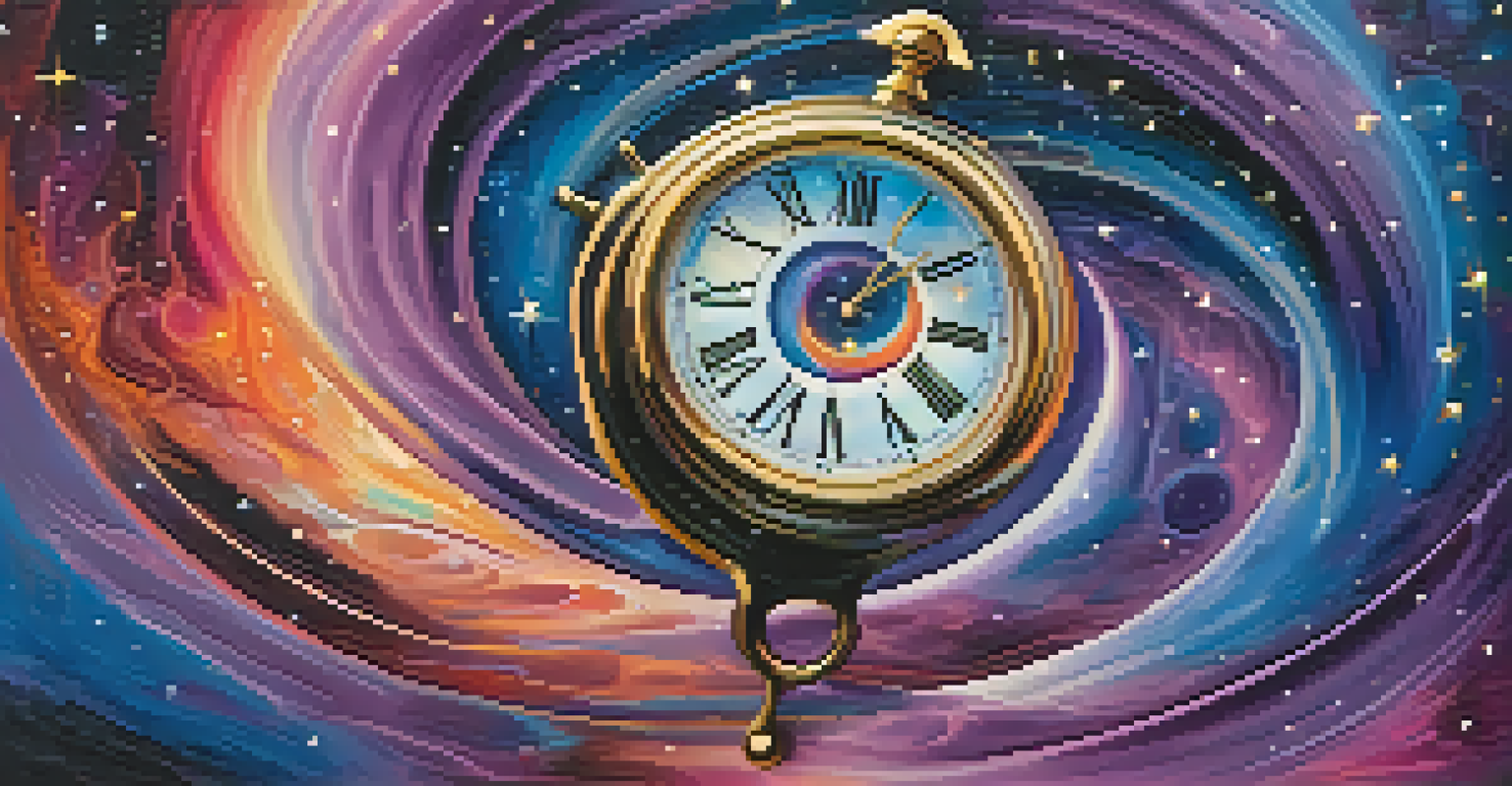How Entheogens Shift Our Sense of Time During Experiences

Understanding Entheogens and Their Effects on Perception
Entheogens are substances that can alter consciousness and perceptions, often used in spiritual or therapeutic contexts. They include naturally occurring plants and fungi, like psilocybin mushrooms and ayahuasca, as well as synthetic compounds. People often report profound changes in their sensory experiences, emotions, and even their sense of self during these journeys.
Time is an illusion. Lunchtime doubly so.
One of the most intriguing aspects of these experiences is how they can distort our perception of time. Moments can stretch out infinitely, or time can seem to collapse into a single point, leading to profound realizations or feelings of euphoria. This shift in the perception of time can create a sense of timelessness, where the past, present, and future feel interconnected.
Understanding how entheogens impact our perception can help us appreciate the depth of these experiences. Time distortion can lead to insights that feel far more significant than the actual duration of the experience. This phenomenon can also foster a greater appreciation for the present moment, a concept often emphasized in mindfulness practices.
The Science Behind Time Perception Alteration
Research into how entheogens alter time perception suggests that these substances affect brain regions responsible for processing temporal information. For instance, the default mode network, which is active during self-referential thought, may become less active, allowing for a more expansive experience of time. This change can lead to a disconnection from the linear flow of time.

Studies have shown that individuals under the influence of entheogens often report moments feeling elongated or compressed. This can be likened to how time seems to fly when we’re having fun or drag during a dull lecture; the brain's processing of experiences can vary significantly based on emotional engagement. In an altered state, this engagement can be heightened, resulting in a stretched sense of time.
Entheogens Alter Time Perception
Entheogens significantly distort our perception of time, leading to profound insights and emotional experiences.
Furthermore, the subjective nature of time perception means that two people can experience the same event but feel time differently. This subjectivity highlights the personal nature of entheogenic experiences, where each individual's journey can lead to unique insights, fostering a deeper understanding of their own consciousness.
Personal Accounts of Time Distortion with Entheogens
Many individuals who have consumed entheogens describe their experiences as both timeless and life-altering. For example, someone might lose track of time entirely, feeling as if they've journeyed through an eternity in just a short period. These accounts often include vivid imagery and profound realizations that feel as if they've been compressed into a singular moment.
The only reason for time is so that everything doesn't happen at once.
People frequently share that during these experiences, they’ve encountered feelings of interconnectedness with the universe that transcends time. This could manifest as a sense of understanding one’s place in the cosmos, or feeling a bond with loved ones that feels eternal. Such feelings can lead to lasting changes in perspective long after the effects of the substance have worn off.
These personal narratives emphasize the transformative potential of entheogens, particularly in how they can help individuals confront past traumas or gain clarity about their lives. The elasticity of time during these experiences often allows for deep introspection, encouraging a shift in how one views their life journey.
Entheogens in Therapeutic Settings: A Time Perspective
In recent years, research has explored the therapeutic potential of entheogens, particularly in treating mental health issues like PTSD and depression. In these contexts, the altered sense of time can play a crucial role in healing. Patients often report feeling as though they can revisit traumatic memories without the usual emotional weight, leading to new insights and emotional release.
Therapists utilizing entheogens note that the time distortion allows patients to process feelings and thoughts in a way that feels less linear and more holistic. This can help break down the barriers that typically hinder healing, offering a fresh perspective on past events. Such experiences can facilitate significant breakthroughs that traditional therapies might not achieve.
Therapeutic Benefits of Time Distortion
In therapeutic settings, the altered sense of time provided by entheogens allows patients to process trauma more holistically.
As the field of psychedelic research continues to grow, understanding the effects of time distortion can enhance therapeutic approaches. By recognizing how these substances can alter perceptions, practitioners can tailor their methods to maximize the benefits of these profound experiences.
Cultural Perspectives on Time and Consciousness
Throughout history, different cultures have recognized the unique relationship between entheogens, time, and consciousness. Indigenous practices often incorporate these substances into rituals, emphasizing their ability to foster a sense of timelessness and connectedness with the spiritual realm. This cultural context provides a rich backdrop for understanding how time is perceived during such experiences.
For many cultures, time is not strictly linear; rather, it can be seen as cyclical or fluid. This perspective aligns closely with the experiences reported by those using entheogens, where past, present, and future may be experienced simultaneously. Such interpretations challenge the conventional view of time and encourage deeper exploration of our consciousness.
By examining these cultural beliefs, we can gain insights into how different societies understand the nature of reality and consciousness. This broader perspective can enrich our own understanding of entheogens and the timeless experiences they can induce, highlighting the interconnectedness of human experience across different contexts.
Philosophical Implications of Altered Time Perception
The way entheogens alter our sense of time raises intriguing philosophical questions about the nature of reality and existence. If time is subjective and can be manipulated by consciousness, what does that mean for our understanding of life and death? Some argue that these experiences challenge the very fabric of our perceived reality, suggesting that time itself may be an illusion.
Philosophers have long debated the concept of time, with various theories proposing that it is either a linear progression or a construct of the mind. Entheogenic experiences can provide a firsthand glimpse into the fluidity of time, prompting individuals to rethink their beliefs about the past, present, and future. This can lead to existential reflections that are both profound and transformative.
Cultural Views on Time and Reality
Different cultures perceive time as fluid rather than linear, reflecting the timeless experiences often reported with entheogens.
Engaging with these philosophical implications can enhance our understanding of entheogens and their capacity to shift consciousness. By contemplating the nature of time, we may uncover deeper truths about ourselves and our place in the universe, encouraging a more meaningful engagement with our experiences.
Integrating Insights from Entheogenic Experiences into Daily Life
The insights gained from entheogenic experiences, particularly regarding time perception, can have lasting impacts on how individuals approach their daily lives. Many find that these experiences encourage a greater appreciation for the present moment, fostering mindfulness and presence in their everyday activities. This shift can lead to more fulfilling relationships and a deeper connection with the world around us.
Additionally, the ability to perceive time differently can inspire creativity and new ways of thinking. People often report feeling more open to possibilities and less constrained by conventional timelines. This can translate into improved problem-solving skills and a more adventurous approach to life's challenges.

Integrating these insights doesn't necessarily require continued use of entheogens; rather, it involves cultivating a mindset that values the lessons learned during those experiences. By embracing the idea that time is fluid, individuals can adopt a more flexible and enriched perspective on their personal journeys, ultimately enhancing their quality of life.